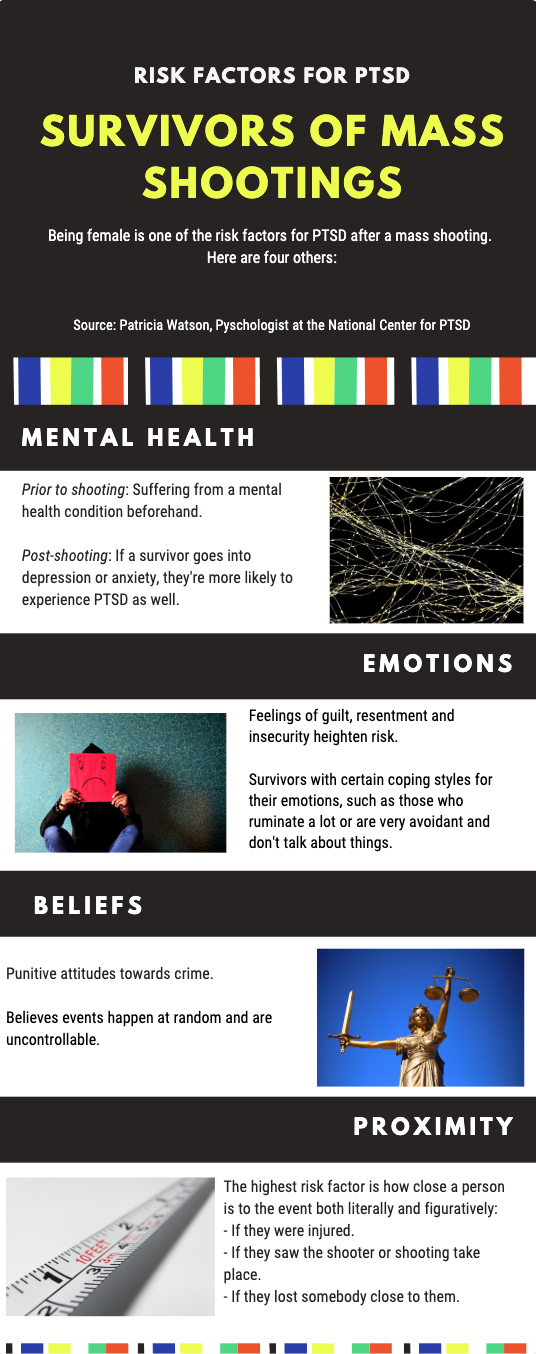The long term effects of school gun violence aren’t just physical. Survivors share their mental health challenges.
Twenty years after the Columbine High School shooting and the tragic memory of that day will forever stay with former English teacher Paula Reed.
“I will never again believe that I am safe anywhere ever.”
Reed understandably was in shock for days after the shooting. Three years later hair loss, hives, and nightmares forced her to take time off. But always with her, the anxiety.
“We had a bomb scare and we all had to evacuate the building and go to the elementary school that we went to that day (April 20, 1999),” said Reed. “I really, really lost it big time. Like one of the school administrators had to drive me home because I couldn’t drive my car and I got to school the next day and fell apart. And, that’s when I finally started getting medicated for the anxiety attacks.”
That was seven years after the shooting.

Fallout for survivors’ mental health is not exact, it comes in fits and starts, and creeps up on you when you least expect it. Survivors grapple with the daunting task of mourning their loved ones, reclaiming their sense of security, and coming to terms with the dangerous situation they encountered. The mental repercussions can take the form of survivor’s guilt, anxiety, or post-traumatic stress disorder.
Samantha Haviland, a survivor of the Columbine shooting waited 10 years to get help.
“I denied myself that with the thought that I didn’t see the worst of it,” she said. “I didn’t experience the worst of it, so I shouldn’t be that [traumatized] and just buck up.”
Haviland was diagnosed with post-traumatic stress disorder. Something that Patricia Watson, a psychologist with the National Center for Post-Traumatic Stress Disorder, said is fairly common.
“I tend to see people across many different types of trauma will try to handle it themselves before they even present to a mental health professional”
But there are certain factors that people should be aware of that make survivors of mass shootings more susceptible to PTSD.
“Depending on how close someone is to the event or some other factors, the rates range from 10 to 40 percent with people having PTSD,” Watson said.
Because of that impact on mental health, school shootings can lay claim to more victims beyond the tragic event.

Six months after Columbine, Anne Marie Hochhalter’s mother killed herself. A little over a year after the tragic shooting, Greg Barnes, a student who witnessed Dave Sanders get shot, died of suicide.
Twenty years ago it was incumbent on the individuals and support systems in the community to help survivors. Support systems like the congregation at Waterstone Community Church. The church is a 10-minute drive from Columbine High School.
“Jefferson Center for Mental Health sent down, I don’t know, 30 or 40 counselors,” Lead Pastor Larry Renoe said. “They would meet with any students that wanted to, they would meet with parents. So, the first week was just like trauma care and a prayer and being together.”
Thirty-five Columbine students took advantage of counseling early on.
“I don’t know what the final amount was, but tons of money were put into counseling funds and events,” Renoe said. “And so the church was pretty generous. I know our church paid for counseling for all our kids and all parents.
Columbine and each school shooting that followed has drawn more attention to the importance of mental health in the aftermath of these tragedies. Dara Hass is an English teacher at Marjory Stoneman Douglas High School. Her classroom was the first one into which bullets were fired.
“It happened on a Wednesday, so like that Wednesday night, that Thursday, that Friday, my husband said that I cried in my sleep all the time and I would wake up hysterical,” Hass said.

That Monday she went to counseling, which she continued into the summer.
“Over the summer I had intense traumatic therapy for four days. Like I stayed overnight at the place and it was fantastic and one of the things they did was they taught you strategies,” Hass said. “We didn’t talk about what happened, we didn’t go over the details again and again, we learned strategies on how to process and ground ourselves when we get caught up in that memory.”
The Florida Legislature passed a bill shortly after the Parkland shooting that provided $69 million to mental health support in school districts, but most of the funding was allocated to addressing possible school shooting threats and not suicide prevention.
Like Columbine before it, the Parkland community has stepped in with mental health resources pouring into the area, including Eagles’ Haven, a mental health wellness center that offers classes like yoga and kickboxing along with focus groups. It is open seven days a week and is staffed with licensed clinicians.

Although it is not an official therapy center, it is available to help those affected by traumatic events like a school shooting. They opened their doors early to serve the community after two people connected to the MSD community died from suicide in the same week. One had already graduated from MSD and was attending college.
As survivors graduate or age out from under the school system’s purview, mental health resources may also become more scarce for those who need it. It’s here where the lessons learned from prior shootings can help provide a better reaction for the survivors of Parkland, and potentially prevent the tragic event from claiming more victims.
Up next: Activism »
 Special Report from WUFT News
Special Report from WUFT News